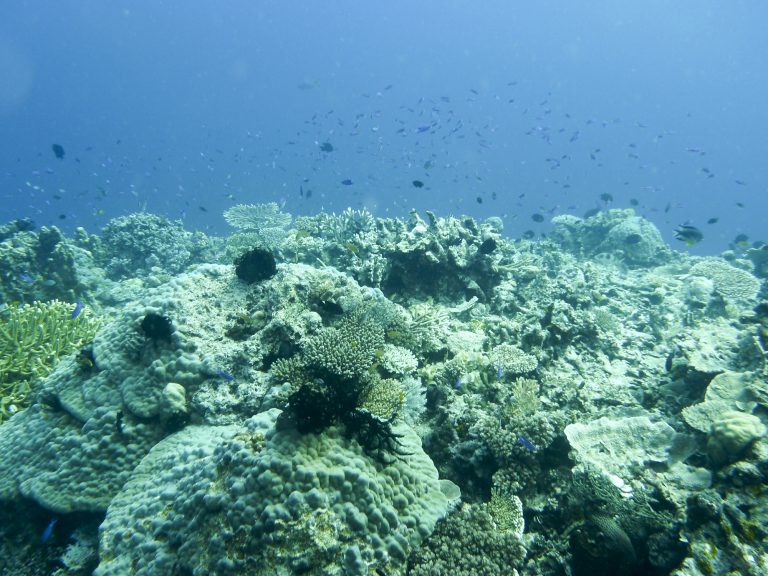Tropical coral reefs lose two thirds of their zooplankton through ocean acidification
Dramatic decline has serious consequences for coral reefs

Tropical coral reefs lose up to two thirds of their zooplankton through ocean acidification. This is the conclusion reached by a German-Australian research team that examined two reefs with so-called carbon dioxide seeps off the coast of Papua New Guinea.
At these locations volcanic carbon dioxide escapes from the seabed, lowering the water’s acidity to a level, which scientists predict for the future of the oceans. The researchers believe that the decline in zooplankton is due to the loss of suitable hiding places. It results from the changes in the coral reef community due to increasing acidification. Instead of densely branched branching corals, robust mounding species of hard coral grow, offering the zooplankton little shelter. In a study published today at the online portal of the journal Nature Climate Change, the researchers report that the impact on the food web of the coral reefs is far-reaching, since these micro-organisms are an important food source for fish and coral.
The volcanic carbon dioxide sources off the coast of Papua New Guinea are a unique natural laboratory. “Here, we can already observe under natural conditions how the reefs may change when the world’s oceans absorb more and more carbon dioxide from the atmosphere and the acidity of their water rises due to climate change,” says coral expert and study co-author Prof Claudio Richter of the Alfred Wegener Institute, the Helmholtz Centre for Polar and Marine Research.
The extent of the ocean acidification is indicated by the pH of the water. The lower this value, the more acidic the water. In tropical seas, researchers usually measure a pH of 8.0 or higher. If this value drops due to acidification, though, the species which are important for a coral reef disappear.
“Our study shows that, in the course of ocean acidification, the structure of the reef fundamentally changes,” says lead author Joy Smith from the Australian Institute of Marine Science. “While many branching corals dominate under normal pH conditions offering ample hiding space for the different species of zooplankton, ocean acidification shifts the community to large, massive bouldering corals, which offer the reef-associated plankton little opportunity for hiding”.
The new research results show that the reefs lose two thirds of their zooplankton in this way. “This decline has far-reaching consequences for the community of life on the reef. For one thing, many fish species feed on zooplankton. On the other hand, the corals are also dependent on the floating food. Given the ever warmer and more acidic water, corals have to channel more energy into calcification, the energy-demanding process governing the formation of their calcium carbonate skeletons. The coral satisfy this additional energy requirement as well as the need for essential nitrogen and phosphorus compounds by eating zooplankton – an option that would become narrower with increasing ocean acidification,” says Claudio Richter.
For this study, the researchers carried out three expeditions to two reefs in the Milne Bay Province in the east of Papua New Guinea. In each case, there were both acidified areas with a pH value of 7.8 as well as areas with a normal pH value, enabling the researchers to compare the data from acidified and non-acidified ‘controls’.
A total of 29 different groups of zooplankton were identified that were hiding in the reef during the day and ascending to eat in the water column after nightfall. “To our surprise, almost all of them were affected by the decline. There were none that completely disappeared, though,” says Claudio Richter.
Lead author Joy N. Smith was funded through the EU doctoral program MARES. She gained doctoral degrees from the universities of Bremen and Plymouth.
Original publication
Joy N. Smith, Glenn De’ath, Claudio Richter, Astrid Cornils, Jason M. Hall-Spencer and Katharina E. Fabricius: Ocean acidification reduces demersal zooplankton that reside in tropical coral reefs, Nature Climate Change, DOI: 10.1038/nclimate3122